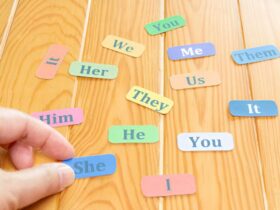IELTS adalah salah satu ujian bahasa Inggris yang banyak digunakan untuk kepentingan pendidikan dan profesional. Hasil ujian IELTS berlaku secara internasional dan kamu akan dikenakan biaya Rp3.150.000 untuk satu kali ujian.
Oleh karena itu, kamu harus memaksimalkan usahamu agar kamu mendapatkan skor yang diharapkan dalam satu kali ujian. Salah satu caranya adalah dengan berlatih mengerjakan soal-soal IELTS sebanyak mungkin agar kamu terbiasa.
Kali ini Cakap akan memberikan beberapa contoh soal IELTS untuk sesi Reading, Listening, Writing, dan Speaking. Yuk, coba kerjain!
Table of Contents
Reading
Passage 1
MAKING TIME FOR SCIENCE
Chronobiology might sound a little futuristic – like something from a science fiction novel, perhaps – but it’s actually a field of study that concerns one of the oldest processes life on this planet has ever known: short-term rhythms of time and their effect on flora and fauna.
This can take many forms. Marine life, for example, is influenced by tidal patterns. Animals tend to be active or inactive depending on the position of the sun or moon. Numerous creatures, humans included, are largely diurnal – that is, they like to come out during the hours of sunlight. Nocturnal animals, such as bats and possums, prefer to forage by night. A third group are known as crepuscular: they thrive in the low-light of dawn and dusk and remain inactive at other hours.
When it comes to humans, chronobiologists are interested in what is known as the circadian rhythm. This is the complete cycle our bodies are naturally geared to undergo within the passage of a twenty-four hour day. Aside from sleeping at night and waking during the day, each cycle involves many other factors such as changes in blood pressure and body temperature. Not everyone has an identical circadian rhythm. ‘Night people’, for example, often describe how they find it very hard to operate during the morning, but become alert and focused by evening. This is a benign variation within circadian rhythms known as a chronotype.
Scientists have limited abilities to create durable modifications of chronobiological demands. Recent therapeutic developments for humans such as artificial light machines and melatonin administration can reset our circadian rhythms, for example, but our bodies can tell the difference and health suffers when we breach these natural rhythms for extended periods of time. Plants appear no more malleable in this respect; studies demonstrate that vegetables grown in season and ripened on the tree are far higher in essential nutrients than those grown in greenhouses and ripened by laser.
Knowledge of chronobiological patterns can have many pragmatic implications for our day-to-day lives. While contemporary living can sometimes appear to subjugate biology – after all, who needs circadian rhythms when we have caffeine pills, energy drinks, shift work and cities that never sleep? – keeping in synch with our body clock is important.
The average urban resident, for example, rouses at the eye-blearing time of 6.04 a.m., which researchers believe to be far too early. One study found that even rising at 7.00 a.m. has deleterious effects on health unless exercise is performed for 30 minutes afterward. The optimum moment has been whittled down to 7.22 a.m.; muscle aches, headaches and moodiness were reported to be lowest by participants in the study who awoke then.
Once you’re up and ready to go, what then? If you’re trying to shed some extra pounds, dieticians are adamant: never skip breakfast. This disorients your circadian rhythm and puts your body in starvation mode. The recommended course of action is to follow an intense workout with a carbohydrate-rich breakfast; the other way round and weight loss results are not as pronounced.
Morning is also great for breaking out the vitamins. Supplement absorption by the body is not temporal-dependent, but naturopath Pam Stone notes that the extra boost at breakfast helps us get energised for the day ahead. For improved absorption, Stone suggests pairing supplements with a food in which they are soluble and steering clear of caffeinated beverages. Finally, Stone warns to take care with storage; high potency is best for absorption, and warmth and humidity are known to deplete the potency of a supplement.
After-dinner espressos are becoming more of a tradition – we have the Italians to thank for that – but to prepare for a good night’s sleep we are better off putting the brakes on caffeine consumption as early as 3 p.m. With a seven hour half-life, a cup of coffee containing 90 mg of caffeine taken at this hour could still leave 45 mg of caffeine in your nervous system at ten o’clock that evening. It is essential that, by the time you are ready to sleep, your body is rid of all traces.
Evenings are important for winding down before sleep; however, dietician Geraldine Georgeou warns that an after-five carbohydrate-fast is more cultural myth than chronobiological demand. This will deprive your body of vital energy needs. Overloading your gut could lead to indigestion, though. Our digestive tracts do not shut down for the night entirely, but their work slows to a crawl as our bodies prepare for sleep. Consuming a modest snack should be entirely sufficient.
Do the following statements agree with the information given in Reading Passage 1?
TRUE if the statement agrees with the information
FALSE if the statement contradicts the information
NOT GIVEN if there is no information on this
1. Chronobiology is the study of how living things have evolved over time.
2. The rise and fall of sea levels affects how sea creatures behave.
Choose the correct letter, A, B, C or D.
3. What did researchers identify as the ideal time to wake up in the morning?
A. 6.04
B. 7.00
C. 7.22
D. 7.30
4. In order to lose weight, we should
A. avoid eating breakfast
B. eat a low carbohydrate breakfast
C. exercise before breakfast
D. exercise after breakfast
5. Which of the following phrases best describes the main aim of Reading Passage 1?
A. to suggest healthier ways of eating, sleeping and exercising
B. to describe how modern life has made chronobiology largely irrelevant
C. to introduce chronobiology and describe some practical applications
D. to plan a daily schedule that can alter our natural chronobiological rhythms
Sudah Tahu Level Bahasa Inggrismu? Ikuti Placement Test Cakap untuk Mengetahuinya!
Listening
You will hear a conversation between a clerk at the enquiries desk of a transport company and a man who is asking for travel information. First you have some time to look at questions 1 to 5.
Narrator:
The man wants to go to Harbour City, so Harbour City has been written in the space.
Now we shall begin. You should answer the questions as you listen because you will not hear the recording a second time. Listen carefully and answer questions 1 to 5.
Woman: Good morning, Travel Link. How can I help you?
Man: Good morning. I live in Bayswater and I’d like to get to Harbour City tomorrow before 11am.
Woman: Well, to get to Bayswater …
Man: No, no. I live in Bayswater – my destination is Harbour City.
Woman: Sorry. Right; so that’s Bayswater to Harbour City. Are you planning to travel by bus or train?
Man: I don’t mind really, whichever option is faster, I suppose.
Woman: Well, if you catch a railway express, that’ll get you there in under an hour … Let’s see – yes, if you can make the 9.30am express, I’d recommend you do that.
Man: Great. Which station does that leave from?
Woman: Helendale is the nearest train station to you.
Man: Did you say Helensvale?
woman: No, Helendale – that’s H-E-L-E-N-D-A-L-E
Man: What’s the best way to get to the Helendale station then?
Woman: Well, hang on a minute while I look into that … Now, it seems to me that you have two options. Option one would be to take the 706 bus from the Bayswater Shopping Centre to Central Street. When you get there, you transfer to another bus which will take you to the station. Or, the second option, if you don’t mind walking a couple of kilometres, is to go directly to Central Street and get straight on the bus going to the train station.
Man: Okay. Which bus is that?
Woman: The 792 will take you to the station.
Man: I guess the walk will be good for me so that might be the better option. What time do I catch the 792?
Woman: There are two buses that should get you to the station on time: one just before nine o’clock and one just after. But look, at that time of the morning it might be better to take the earlier one just in case there’s a traffic jam or something. The 8.55 is probably safer than the 9.05.
Man: Yeah, I don’t want to the miss the train, so I’ll be sure to get on the five-to-nine bus.
Questions 1–5
Complete the notes below.
Write no more than two words and/or a number for each answer.
Transport from Bayswater
Destination Harbour City
- Express train leaves at (1) …………………….
- Nearest station is (2) …………………….
- Number 706 bus goes to (3) …………………….
- Number (4) ……………………. bus goes to station
- Earlier bus leaves at (5) …………………….
Kursus Bahasa Inggris di Cakap, Bebas Atur Jadwal Belajar
Writing
Task 1
You should spend about 20 minutes on this task.
The graphs below give information about computer ownership as a percentage of the population between 2002 and 2010, and by level of education for the years 2002 and 2010.
Summarise the information by selecting and reporting the main features, and make comparisons where relevant.
Write at least 150 words.
Task 2
You should spend about 40 minutes on this task.
Write about the following topic:
A person’s worth nowadays seems to be judged according to social status and material possessions. Old-fashioned values, such as honour, kindness and trust, no longer seem important.
To what extent do you agree or disagree with this opinion?
Give reasons for your answer and include any relevant examples from your own knowledge or experience.
Write at least 250 words.
Speaking
Part 1 Introduction and interview (4-5 minutes)
Topic: Studies
- Do you go to college or university?
- What do you study in your college/uni?
- What do you like most about it?
- What will you do after you graduate?
Part 2 Individual long turn (3-4 minutes)
Topic: Describe a subject you enjoyed studying at school.
Part 3 Two-way discussion (4-5 minutes)
Topic: Education
- What makes a good student?
- What role should the teacher have in the classroom?
- Do you think computers will one day replace teachers in the classroom?
- How has teaching changed in your country in the last few decades?
- What is the difference between the way children learn and the way adults learn?
- How can a teacher make lessons for children more interesting?
Jawaban Contoh Soal IELTS
Reading
- FALSE
- TRUE
- C
- C
- C
Listening
- 9.30 (am)
- Helendale
- Central Street/St
- (number/no./#) 792
- 8.55 (am)
Writing
Task 1
The bar charts show data about computer ownership, with a further classification by level of education, from 2002 to 2010.
A steady but significant rise can be seen in the percentage of the population that owned a computer over the period. Just over half the population owned computers in 2002, whereas by 2010 three out of four people had a home computer.
An analysis of the data by level of education shows that higher levels of education correspond to higher levels of computer ownership in both of those years. In 2002, only around 15% of those who did not finish high school had a computer but this figure had trebled by 2010. There were also considerable increases, of approximately 30 percentage points, for those with a high school diploma or an unfinished college education (reaching 65% and 85% respectively in 2010). However, graduates and postgraduates proved to have the greatest level of ownership in 2010, at 90% and 95% respectively, 20 percentage points higher than in 2002.
The last decade has seen a substantial growth in computer ownership in general, and across all educational levels.
Task 2
Given the power and influence of the super rich, it might seem as if social status and material possessions are the new symbols of personal worth, but in everyday life I do not think this is true.
It is apparent that most celebrities today are admired or envied solely for their material wealth or position in various social hierarchies. Many of these people are known to turn their backs on friends, cheat on their spouses or spend their evenings over-indulging in alcohol and/or drugs. Things like owning a mansion, driving an expensive car and getting into A-list parties are exalted above old-fashioned values. Ultimately, though, it is the many readers of gossip magazines and celebrity blogs who reinforce these ideas.
Nevertheless, I do believe that in their day-to-day lives most people still believe in values such as honour, kindness and trust. In some way most of us want to form loving families, raise our children to be good citizens, stand up for the downtrodden and protect our communities from harm. We still form friendships, romances and business partnerships based on old-fashioned criteria. When our trust is abused or we are unfairly treated, we see that as a major violation of our relationship and we judge the wrongdoer accordingly.
In conclusion, I believe there is some truth to the notion that status and possessions have superseded old-fashioned values as a measure of a person’s worth. Looking beyond the tabloids, however, it is apparent that most ordinary people have still preserved an old-fashioned conscience.
Speaking
Part 1
What are you studying at the moment?
I’m studying history at university. It’s a four year course, and I started it three years ago, so I have just one year left. I’m enjoying it a lot so it will be sad to finish.
What do you like most about your studies?
We learn about many things from the past such as politics and wars, but I like learning about how people lived in the past the most. It’s amazing to see how our lives have changed so much from the past up until now. In some ways our lives have got much easier now, but in other ways the simplicity of life in the past made people much happier. Learning about all that is fascinating.
What do you hope to do in the future when you have finished?
I’m not sure at the moment, but I may go into teaching. This is why I’m doing the IELTS, as I intend to carry on and do a Masters in a specific area of history. I’ll probably decide for sure what to do when I have completed that.
Part 2
You should say:
- When and where you started studying it
- What lessons were like
- What made the subject different from other subjects
- And explain why you enjoyed the subject
Part 3
What makes a good student?
A good student demonstrates dedication by attending classes on a regular basis and finishing homework on time. They demonstrate curiosity by asking questions and attempting to gain a better understanding. Good students are also organized and disciplined, have good time management skills, work well with their peers, and approach obstacles with a growth mindset.
What role should the teacher have in the classroom?
Teachers have a critical role in creating a positive learning environment. They are in charge of clearly presenting material and guiding classroom discussions. Teachers should also be approachable and supportive, encouraging students to ask questions and seek help when needed. They modify their teaching approaches to accommodate different learning styles and provide constructive feedback to help students in improving.
Do you think computers will one day replace teachers in the classroom?
While technology has had a huge impact on education, it appears that computers will never completely replace teachers. Computers and digital tools improve learning by supplying resources and interactive information. Teachers, on the other hand, provide critical aspects such as human interaction, emotional support, and the ability to adjust to specific student needs, making them irreplaceable in the educational process.
How has teaching changed in your country in the last few decades?
Teaching in Indonesia has changed significantly in the last several decades. Traditional chalk-and-talk approaches have been changed into interactive and student-centered methods by modern teaching methods, technology integration, and revised curriculum standards. Education has changed to emphasize skill development, critical thinking, and alignment with modern workforce demands.
What is the difference between the way children learn and the way adults learn?
Children and adults have different learning styles. With shorter attention spans, children often learn through play, exploration, and repetition. Visual and interactive content is helpful for them. Adults, on the other hand, bring life experiences and self-motivation to their learning, seeking relevance and frequently thriving through discussions, problem-solving, and practical application of knowledge.
How can a teacher make lessons for children more interesting?
Teachers can make lessons more engaging for students using colorful visuals, interactive content, group activities, and real-life examples that are relevant to their daily lives. Storytelling, educational games, and maintaining a positive and supportive classroom environment are all effective ways to capture children’s interest and improve their learning experience.
Demikianlah contoh soal IELTS dan jawabannya yang bisa kamu jadikan bahan untuk latihan persiapan. Selanjutnya, agar kamu bisa memperkirakan skor kemampuan bahasa Inggrismu, kamu bisa mengambil simulasi IELTS di Cakap, lho. Selain itu, kamu juga bisa mengakses video pembahasan IELTS yang langsung dibawakan oleh Teacher dari Cakap. #SiapaCakapDiaDapat
Baca juga:













